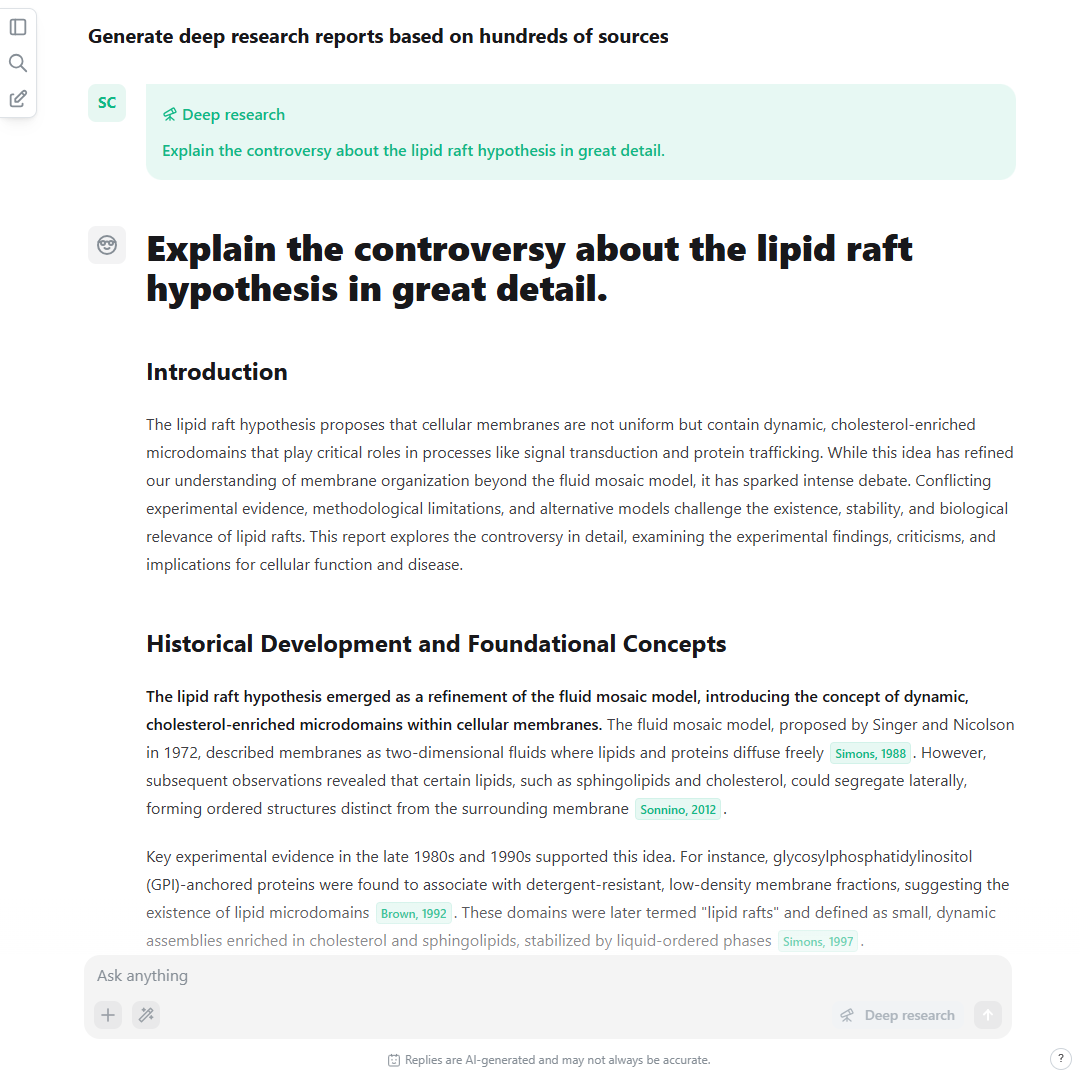Literature reviews are comprehensive overviews of existing knowledge on a specific topic. They synthesize current research, identify gaps, and provide context for new investigations. The primary purpose is to situate a research project within the existing body of knowledge.
A typical literature review includes the following components:
- Introduction: The introduction defines the review’s topic, research question, and scope.
- Body: The body organizes the literature into themes, trends, or methodologies, critically analyzing each source.
- Conclusion: The conclusion summarizes significant findings, identifies gaps, and suggests areas for further research.
Literature reviews are integral to theses, dissertations, research proposals, and journal articles. They help justify the research approach, ensure originality, and guide scholarly and policy decisions.
An AI tool for literature reviews
Conducting a literature review is traditionally time-consuming and labour-intensive. However, AI-powered tools offer transformative support by automating key tasks such as literature search, evaluation, and synthesis. These tools apply advanced filters, assess methodology, and perform citation analyses – helping researchers uncover thematically connected studies and sample relevant work more efficiently.

AI-based literature review generator. A screenshot of a literature review generated with the “Deep research” mode and based on hundreds of sources.
The AI research agent scienceOS goes beyond simply identifying research gaps. It also acts as an AI literature review generator, capable of assisting you in drafting well-structured reviews. Supporting both the discovery and writing phases, AI agents like scienceOS help researchers set up a review’s structure and build the foundation for deeper analysis.
This tutorial will demonstrate how to integrate the AI tool scienceOS into your literature review workflow.
Starting from scratch with “Deep research”
The “Deep research” mode in scienceOS helps generate a first draft of a literature review based on your chosen topic and criteria. This feature is beneficial for building an initial structure and guiding the writing process.
Here is how to use it:
- Start: Start a new chat.
- Describe your topic: Describe your topic and specific criteria (e.g., methodology, time frame, author).
- Use “Deep research”: Use the “Deep research” mode; the AI research agent will browse hundreds of relevant sources and generate a detailed report.
The AI-generated review will be several pages long and include key structural elements – introduction, body, and conclusion – organized around the most relevant findings. You may also copy the generated text for offline use, add the cited papers to your personal library, or continue chatting to dig deeper into individual sections.
AI literature review writing with your library
It is also possible to generate a draft report based on the sources in your personal library or shared projects. Simply follow these steps:
- Upload papers
Upload PDFs, connect and import your Zotero web library, or add an export of your reference manager to your scienceOS library.
- Chat with your library
Go to the project “Library chat”; when chatting with this project, the AI agent considers all sources in your library.
- Describe your topic
Describe your topic and specific criteria (e.g., methodology, time frame, author) in the message bar.
- Use “Deep research”
Use the “Deep research” mode; the AI research agent will generate a literature review based on the sources in your library. (If your library contains PDFs, citation marks will also include page numbers, allowing for easy double-checking.)
Drafting a literature review based on your reference manager is ideal for quickly generating comprehensive mini-reviews or solid first drafts for sections like the introduction of a grant application.

Writing literature reviews with AI based on your library. A short video showing how to use the “Library chat” project to generate deep research reports based on thousands of PDFs and critically review the generated literature review by accessing 230 million abstracts.
Additionally, you can use the AI Action “Critical review” to evaluate what might be missing in your literature review by analysing gaps and recommending additional perspectives based on papers outside your library. For this, you need to check “230 million research papers” in the project sources of the “Library chat” project.
Generating literature reviews with projects
It is also possible to draft a report based on a subset of papers from your library by organizing your sources into collections and creating custom projects.
- Upload papers: Click the pink plus button in the top right corner of your scienceOS library to upload PDFs from your computer, import sources from your Zotero web library, or provide a list of DOIs.
- Add sources to collections: Select relevant sources in the AI reference manager, click “Add to collection(s)” and create new collection tags or choose from existing collections. Confirm your selection to finish the process.
- Create a new project: Select the collection and click on “Chat with…” to create a project based on the collection. Alternatively, use the “New project” button on the app homepage. Name the project to reflect your topic or goal.
- Add sources to the project: Stick with the selected collection or add further papers to the project sources. You can also enable or disable the “230 million research papers” option to include the scienceOS paper index in your new project. (You can still modify the project sources after the creation of the project.)
- Invite and manage project members (optional): During the last step of the project setup, copy the project invitation link and send it to your colleagues. (Generate new invitation links by clicking “Share” on the project homepage.)
- Describe your topic: Describe your topic and specific criteria (e.g., methodology, time frame, author) in the message bar.
- Use “Deep research”: Use the “Deep research” mode; the AI research agent will generate a literature review based on the sources added to the project.

Writing literature reviews with AI based on your projects. A brief video showing how to upload PDFs to your library, organize them in collections, create a new project that contains the collection, and write a literature review based on the sources added to the project.
Whether using the whole library or a specific project collection, scienceOS allows you to refine and build upon the generated draft easily. You can copy the draft for offline editing, continue expanding the literature review using additional AI features, or visualise the citation network of sources used to formulate the report.
An AI literature review generator
The scienceOS AI research agent supports researchers throughout the literature review process, from summarizing research papers and organizing your literature collection to amplifying insights and producing structured drafts. By integrating it into your workflow, you not only speed up your research but also elevate the quality and focus of your literature review writing.




